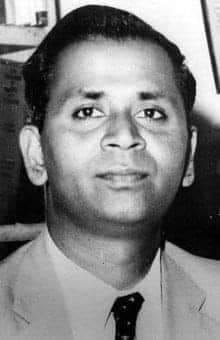|
Dr. Rudranath Capildeo was a Trinidadian scholar who made contributions in the fields of applied mathematics and physics. He studied the nature of space and time and this sparked his interest in understanding Einstein’s Theory of Special Relativity. His work resulted in new theories, such as the “Theory of Rotation and Gravity” or “Capildeo’s Theory” for short. This theory had applications in early outer space expeditions in the 1960s and 1970s.
Capildeo was a gifted educator who spent most of his teaching life at the University College, London. He also taught at other institutions including the University of Khartoum, Sudan and he was the first principal of Trinidad Polytechnic School. He wrote a mathematics textbook entitled “Vector Algebra and Mechanics: Theory, Problems, and Solutions”. Rudranath Capildeo was born in Chaguanas, Trinidad on February 2nd 1920 at “The Lion House”. He attended Queen’s Royal College (QRC) and won an Open National Scholarship in 1939. He began studies in medicine at Oxford University, but due to illness, he switched to mathematics at University College London. He completed an intermediate bachelor of science degree and followed with a BSc Special Degree in Mathematics. He copped several prizes and graduated in 1943. Capildeo returned to Trinidad and taught Mathematics at QRC for a brief period. He furthered his studies at University College London and gained a Master of Science degree in 1945 and a Doctorate in Mathematical Physics in 1948. His ability to manipulate mathematical techniques enabled him to solve any problem. His logical mind, skill in debating, and clear understanding of his subject assisted him in explaining complicated mathematical theories to his students and laypeople. He proceeded to clarify and fortify Einstein’s Theory of Special Relativity because he “knew it inside out, upside down, and sideways”. Apart from his achievements in science, Dr. Capildeo studied law in London and was admitted to practise as a Barrister-at-Law in Trinidad. He founded and led the Democratic Labour Party and became Leader of the Opposition in the Trinidad and Tobago Parliament when the country became independent. He was considered an outstanding scholar, yet, the full potential of his work is not fully understood. For his great achievements in science, he was awarded one of the inaugural National Awards- the Trinity Cross- from the Government of Trinidad and Tobago in 1969. He died on May 12, 1970. (Source: Caribbean Hindustani, Marrch 2022)
0 Comments
Leave a Reply. |
T&T news blogThe intent of this blog is to bring some news from home and other fun items. If you enjoy what you read, please leave us a comment.. Archives
February 2025
Categories
All
|


 RSS Feed
RSS Feed